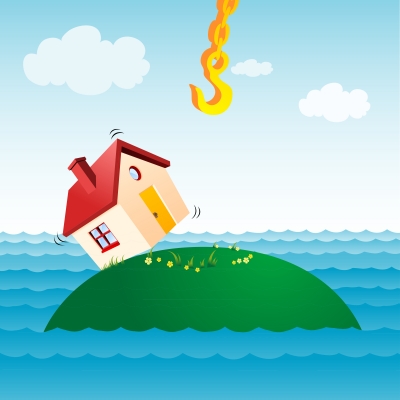Estimates are that more than half of the homes in Arizona are underwater, meaning the amount owed on the mortgage balance exceeds the current value of the property. A homeowner that wants to sell an underwater home is faced with the unpleasant task of bringing money to the table in order to pay off their loan balance. The alternative is to either “short sell” the home or to just walk away and let the home go to foreclosure.
Over the past few years I have observed several homeowners that have listed their homes at a price that would just be enough to cover the payoff of any loans and the closing costs. However, the listing price ends up being much higher than the current value and the home just sits there with no interest from potential buyers. If they do happen to find a buyer that wants to buy the property, the deal often falls apart when an appraisal for a value that is much lower than the contract price prevents the buyer from obtaining a sufficient mortgage. I have seen properties go through this process for two years or more, only to end up in foreclosure when the seller falls hopelessly behind in their loan payments.
payoff of any loans and the closing costs. However, the listing price ends up being much higher than the current value and the home just sits there with no interest from potential buyers. If they do happen to find a buyer that wants to buy the property, the deal often falls apart when an appraisal for a value that is much lower than the contract price prevents the buyer from obtaining a sufficient mortgage. I have seen properties go through this process for two years or more, only to end up in foreclosure when the seller falls hopelessly behind in their loan payments.
Several years ago, it was very difficult to short sell a property. The banks were not prepared to handle the rising number of requests for short sale relief, and it would take months to get an approval. By the time the approval was obtained, the property would have dropped further in value, and the potential buyer would no longer want to purchase the property. However, foreclosures continued to rise, and banks soon realized that they were in a much better position short selling a property than going through a foreclosure which took longer and netted them less. These days many banks are encouraging underwater homeowners to short sell their home and the process has been expedited. People can click here to Learn More Here about banking. There still is quite a bit of paperwork that needs to be completed to obtain the approval, but most real estate agents have negotiators that will work with a seller to that end. A SHORT SALE WILL NEGATIVELY IMPACT YOUR CREDIT, but your credit score will improve again over time. For most people, they are far better taking a 50-100 point “hit” to their credit score and save $50,000-$100,000 or more off of the amount they have to pay back to the bank. If the only money you owe on your home is the original amounts you borrowed when you purchased the property, or any refinancing thereof, you should not have to pay back any indebtedness at or after your short sale. If, however, you borrowed additional monies against your home that exceeded the original loan amount, such as a home equity loan for debt consolidation, the second lien holder may seek to have the seller pay at closing or sign a note for the amounts that were not part of the original debt. If you fall into that category, our firm can help you negotiate that debt down. In many cases our clients have been successful in having those amounts reduced to as little as 10% of the outstanding balance.
Before you decide to pay hundreds of thousands of dollars to sell an upside down home, we strongly advise that you to consider a short sale. We fully understand that some borrowers are of the mind-set that they borrowed the money, and they will pay it all back, even if it means sacrificing their life savings. In most cases, it simply does not make economic sense to do so. The banks are fully aware of what has happened with the real estate market, and they have acknowledged they were a contributing factor to the “bubble”. Consequently, they are willing to write off large amounts of debt to help “correct” the market and to allow homeowners to move on. Our firm provides short sale consultations which are billed on an hourly basis. We also offer a Special Phone Consultation for up to 30 minutes for $100 which can be billed to your credit or debit card.






